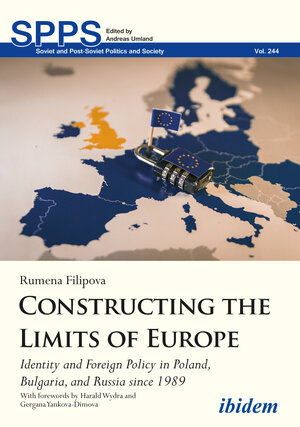
„A forensic account of varying Eastern and Central European perspectives on the process of Euro-Atlantic integration in post-communist Europe since 1989 with a particular focus on Poland, Bulgaria, and Russia. The book is an innovative and, in many respects, cautionary tale, reminding that the tortuous process of integration depended on long-term culturally and historically embedded attitudes and affinities—and therefore could not start from scratch.“—Neil MacFarlane, Lester B Pearson Professor of International Relations, University of Oxford
"Rumena Filipova's Constructing the Limits of Europe is a masterpiece of applied constructivism. Her book is essential for understanding how the three different histories and identities of Poland, Bulgaria, and Russia have shaped their differing responses to Europe and the West after the dramatic changes of 1989. This book definitely deserves a place on the syllabi of international relations theory courses as well as ones on the international relations of Europe. We need more such studies about different countries and different regions of the world."—Mark N. Katz, Professor of Government and Politics, George Mason University
Constructing the Limits of Europe
Identity and Foreign Policy in Poland, Bulgaria, and Russia since 1989
von Rumena Filipova, Vorwort von Harald Wydra und Vorwort von Gergana Yankova-DimovaThis comparative study harks back to the revolutionary year of 1989 and asks two critical questions about the resulting reconfiguration of Europe in the aftermath of the collapse of communism: Why did Central and East European states display such divergent outcomes of their socio-political transitions? Why did three of those states—Poland, Bulgaria, and Russia—differ so starkly in terms of the pace and extent of their integration into Europe?
Rumena Filipova argues that Poland’s, Bulgaria’s, and Russia’s dominating conceptions of national identity have principally shaped these countries’ foreign policy behavior after 1989. Such an explanation of these three nations’ diverging degrees of Europeanization stands in contrast to institutionalist-rationalist, interest-based accounts of democratic transition and international integration in post-communist Europe.
She thereby makes a case for the need to include ideational factors into the study of International Relations and demonstrates that identities are not easily malleable and may not be as fluid as often assumed. She proposes a theoretical “middle-ground” argument that calls for “qualified post-positivism” as an integrated perspective that combines positivist and post-positivist orientations in the study of IR.
Rumena Filipova argues that Poland’s, Bulgaria’s, and Russia’s dominating conceptions of national identity have principally shaped these countries’ foreign policy behavior after 1989. Such an explanation of these three nations’ diverging degrees of Europeanization stands in contrast to institutionalist-rationalist, interest-based accounts of democratic transition and international integration in post-communist Europe.
She thereby makes a case for the need to include ideational factors into the study of International Relations and demonstrates that identities are not easily malleable and may not be as fluid as often assumed. She proposes a theoretical “middle-ground” argument that calls for “qualified post-positivism” as an integrated perspective that combines positivist and post-positivist orientations in the study of IR.





